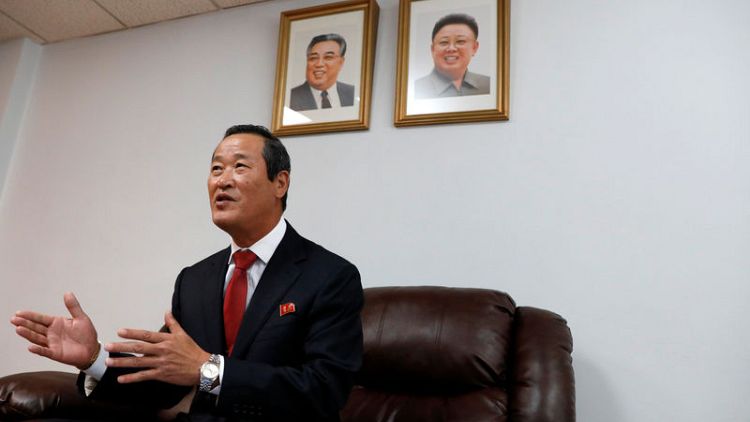By Michelle Nichols and David Brunnstrom
UNITED NATIONS/WASHINGTON (Reuters) - North Korea's ambassador to the United Nations said on Saturday that denuclearisation is off the negotiating table with the United States and lengthy talks with Washington are not needed, the starkest statement yet emphasizing the gulf between the two sides ahead of a year-end deadline set by Pyongyang.
U.S. President Donald Trump sought to play down a recent surge in tensions with North Korea, stressing what he said was his good relationship with its leader Kim Jong Un and saying he thought Kim wanted a deal, not to interfere in next year's U.S. presidential election.
"We'll see about North Korea. I'd be surprised if North Korea acted hostilely," Trump told reporters at the White House before leaving for Florida.
"He knows I have an election coming up. I don't think he wants to interfere with that, but we'll have to see ... I think he'd like to see something happen. The relationship is very good, but you know, there is certain hostility, there's no question about it."
Trump has invested considerable time trying to persuade North Korea to give up a nuclear weapons program that has grown to threaten the United States, but progress has been scant in spite of his three meetings with Kim Jong Un.
Tensions have risen ahead of a year-end deadline set by North Korea, which has called on the United States to change its policy of insisting on Pyongyang's unilateral denuclearisation and demanded relief from punishing sanctions.
Kim Jong Un has warned of an unspecified "new path" next year, raising fears this could mean an end to a suspension in nuclear bomb and long-range missile testing in place since 2017 that Trump has held up as a key win from his engagement efforts.
U.N. Ambassador Kim Song said in a statement the "sustained and substantial dialogue" sought by the United States was a "time-saving trick" to suit its domestic political agenda, a reference to Trump's 2020 reelection bid.
"We do not need to have lengthy talks with the U.S. now and denuclearisation is already gone out of the negotiating table," he said.
Kim Song's comments appeared to go further than North Korea's earlier warning that discussions related to its nuclear weapons program might have to be taken off the table given Washington's refusal to offer concessions.
On Tuesday, North Korea's Foreign Ministry repeated a call for Washington to change its "hostile policies" and said it was up to Washington to decide what "Christmas gift" came at the end of the year.
Kim Song also hit out at a statement this week from EU members of the U.N. Security Council criticizing recent short range launches by North Korea, calling it a "serious provocation" and saying they were playing the role of "pet dog" of the United States.
SUMMITS, BUT LITTLE PROGRESS
Recent days have seen a return to the highly charged rhetoric that raised fears of war two years ago.
In 2017, Trump and Kim Jung Un famously engaged in a war of words, with Trump calling Kim Jong Un "Rocket Man" and North Korea calling Trump, now 73, a "dotard."
On Tuesday, Trump once again called Kim "Rocket Man" and said the United States reserved the right to use military force against North Korea. Pyongyang said any repeat of such language would represent "the relapse of the dotage of a dotard."
In spite of Trump's reprise of the Rocket Man meme, he has still expressed hope that Kim Jong Un would denuclearise. On Friday the U.S. ambassador to the United Nations said the United States had not yet decided whether to have a U.N. Security Council meeting to discuss North Korean human rights abuses that has angered Pyongyang.
On Friday, South Korea said Trump and South Korean President Moon Jae-in held a half-hour phone discussion on ways to maintain diplomacy with North Korea.
It said the two leaders agreed the situation has become "severe" and "dialogue momentum should be maintained to achieve prompt results from denuclearisation negotiations."
Many diplomats, analysts and U.S. officials have long doubted North Korea's willingness to negotiate away a nuclear program it has invested decades and a large proportion of limited national resources in creating.
Even so, Jenny Town of 38 North, a Washington-based North Korea project, said it was unclear how literally Kim Song's words should be taken.
"It’s an interesting choice of spokesperson. Kim Song is not directly involved in the negotiation process," she said.
"These kinds of hardline messages are increasing in frequency as the deadline approaches, perhaps to try to compel a last-minute offer. Although the more they push like this, the less likely they are to get what they want."
Town said North Korea has previously indicated a willingness to give up parts of its nuclear program as a first-phase deal, but not to discuss complete denuclearisation up front.
"The North Koreans have always preferred a step by step approach rather than negotiating everything all at once," Town said. "It is possible this is what Kim Song means, since we haven’t heard anything quite so stark from those involved in the negotiations."
(Reporting by Michelle Nichols, Jan Pytalski, David Brunnstrom and Tim Ahmann; editing by Chris Reese and Grant McCool)
